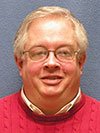Faith and Family / Sean Gallagher
Death is a birth into eternal life
 It is a broad human custom to give more attention to celebrating the birthday of a person than recalling the anniversary of his or her death. Gifts are given, cakes are baked and parties are held on birthdays.
It is a broad human custom to give more attention to celebrating the birthday of a person than recalling the anniversary of his or her death. Gifts are given, cakes are baked and parties are held on birthdays.
Friends and relatives of the deceased may recall in their heart and mind their loved one who has gone before them on the date on which that person died. They may give time in prayer, seeking the repose of his or her soul, thanking God for the deceased’s example or for asking God to help them live more like him or her.
But these are, for the most part, private acts of love and gratitude, not public celebrations. This is, at least in part, related to the overall secular nature of our culture, which is largely focused on this world alone.
The Church has a different perspective on setting dates for celebrations. Almost since its beginning 2,000 years ago, it has given praise and thanks to God for how he has led men and women to holiness with feast days for individual saints. Ordinarily, though, the date for these feasts is on the anniversary of their deaths, not their births.
That’s not entirely accurate, though, because the Church would say that on the day a person’s earthly life is over is a kind of birthday, the day on which he or she is born into eternal life. And we believe that people who die in God’s grace have heaven as their ultimate destination. They will thus be saints, whether they are formally recognized as such or not.
The relatively obscure tradition within the Catholic Church of honoring a saint on the anniversary of his or her death is one that I think could benefit our culture more broadly. Our culture tends to celebrate things that are seen as positive, such as a birth, but tries to downplay anything troublesome or negative, like death. This is the case, at least in part, because of our culture’s secular nature. Being rather narrowly focused on this world alone, it can’t give a satisfying answer to what happens to a person after he or she dies.
Christianity, on the other hand, offers the world a positive outlook on the ending of one’s earthly life. If one, with the help of God’s grace, lives according to his will, then death can be put into a proper perspective. Fear or anxiety might still be instinctual human reactions to death. But faith can lift us above such a limited outlook, and help us see death against a horizon of hope and joy.
Thanks to the faith that my parents nurtured in me when I was young, this understanding of death and the birth into eternal life has guided me over the past year since my mother died on Oct. 17, 2015. When the first anniversary of her death came earlier this month, my family didn’t invite friends over for a party. Instead, we did what was appropriate for our Catholic faith: we worshipped at a Mass at our parish that was offered for the repose of her soul.
Despite all the technological and medical advances that we so naturally celebrate, death is still a reality that we cannot escape. But it’s not something we need to fear. God offers us a way beyond our fear. Accept it with trust and joy.
The upcoming feasts of All Saints and All Souls can renew this trust and joy in each of our hearts. November is also a month in the Church when we’re invited especially to pray for our faithful departed.
Embrace more fully the traditions and teachings of our faith connected to these feasts and this month, and you might help the world in which we live to have a broader, more healthy and, ultimately, more joyful perspective on death. †
 It is a broad human custom to give more attention to celebrating the birthday of a person than recalling the anniversary of his or her death. Gifts are given, cakes are baked and parties are held on birthdays.
It is a broad human custom to give more attention to celebrating the birthday of a person than recalling the anniversary of his or her death. Gifts are given, cakes are baked and parties are held on birthdays.